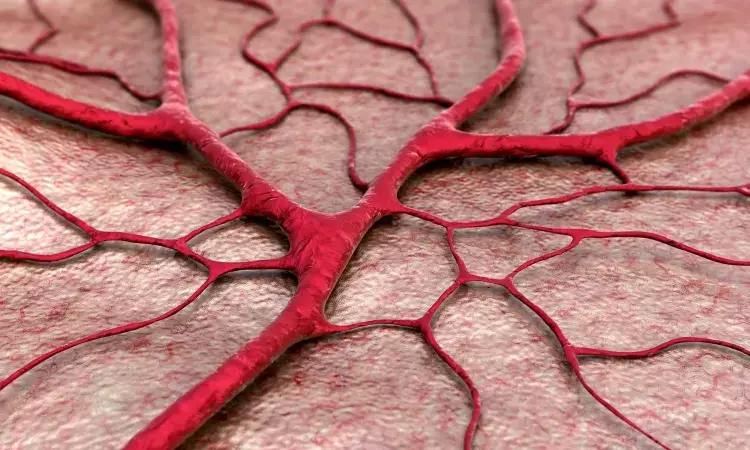- Home
- Medical news & Guidelines
- Anesthesiology
- Cardiology and CTVS
- Critical Care
- Dentistry
- Dermatology
- Diabetes and Endocrinology
- ENT
- Gastroenterology
- Medicine
- Nephrology
- Neurology
- Obstretics-Gynaecology
- Oncology
- Ophthalmology
- Orthopaedics
- Pediatrics-Neonatology
- Psychiatry
- Pulmonology
- Radiology
- Surgery
- Urology
- Laboratory Medicine
- Diet
- Nursing
- Paramedical
- Physiotherapy
- Health news
- Fact Check
- Bone Health Fact Check
- Brain Health Fact Check
- Cancer Related Fact Check
- Child Care Fact Check
- Dental and oral health fact check
- Diabetes and metabolic health fact check
- Diet and Nutrition Fact Check
- Eye and ENT Care Fact Check
- Fitness fact check
- Gut health fact check
- Heart health fact check
- Kidney health fact check
- Medical education fact check
- Men's health fact check
- Respiratory fact check
- Skin and hair care fact check
- Vaccine and Immunization fact check
- Women's health fact check
- AYUSH
- State News
- Andaman and Nicobar Islands
- Andhra Pradesh
- Arunachal Pradesh
- Assam
- Bihar
- Chandigarh
- Chattisgarh
- Dadra and Nagar Haveli
- Daman and Diu
- Delhi
- Goa
- Gujarat
- Haryana
- Himachal Pradesh
- Jammu & Kashmir
- Jharkhand
- Karnataka
- Kerala
- Ladakh
- Lakshadweep
- Madhya Pradesh
- Maharashtra
- Manipur
- Meghalaya
- Mizoram
- Nagaland
- Odisha
- Puducherry
- Punjab
- Rajasthan
- Sikkim
- Tamil Nadu
- Telangana
- Tripura
- Uttar Pradesh
- Uttrakhand
- West Bengal
- Medical Education
- Industry
Type 2 diabetes patients with polyvascular disease at increased risk of MACE: EXSCEL trial

USA: The risk of MACE and mortality increases incrementally with each additional diseased arterial bed in patients with type 2 diabetes versus those without atherosclerotic vascular disease, show results from the Exenatide Study of Cardiovascular Event Lowering (EXSCEL) trial. The study was published in the journal Atherosclerosis on November 01, 2021.
Polyvascular disease is known to be an independent predictor of major adverse cardiovascular events (MACE) and all-cause mortality (ACM). The relationship between the number of diseased arterial beds and MACE, especially in type 2 diabetes (T2D) patients, is not known. Also, it is unknown of r heart failure (HF) status and hemoglobin A1c (HbA1c) levels influence outcomes in polyvascular disease.
Against the above background, Marc D. Samsky, Duke University School of Medicine, Durham, NC, USA, and colleagues' analysis from the EXSCEL trial was aimed to examine the risk associated with an increasing number of diseased arterial beds on MACE and ACM.
Cox models were used to test associations between the number of diseased arterial beds and MACE and ACM. The researchers also performed prespecified interaction testing between the number of diseased arterial beds with baseline HF, HbA1c (≤8% vs. >8%), and treatment assignment.
The study revealed the following findings:
- 14,751 participants were included; 26.5% were without atherosclerosis, 58.9% had 1-bed, 12.3% had 2-bed, and 2.3% had 3-bed disease
- An increasing burden of atherosclerotic disease was associated with increasing risk of MACE (adjusted HR [aHR] 1.71; 2.61; 3.46 for 1, 2, and 3 beds, respectively) and ACM (1.94; 3.03; 3.66 for 1, 2, and 3 beds, respectively).
- Prespecified interaction testing did not reveal any significant associations.
The researchers concluded, "In patients with T2D, compared to those without atherosclerotic vascular disease, risk of MACE and ACM increases incrementally with each additional diseased arterial bed."
Reference:
The study titled, "Polyvascular disease and increased risk of cardiovascular events in patients with type 2 diabetes: Insights from the EXSCEL trial," is published in the journal Atherosclerosis.
DOI: https://www.atherosclerosis-journal.com/article/S0021-9150(21)01409-X/fulltext
Dr Kamal Kant Kohli-MBBS, DTCD- a chest specialist with more than 30 years of practice and a flair for writing clinical articles, Dr Kamal Kant Kohli joined Medical Dialogues as a Chief Editor of Medical News. Besides writing articles, as an editor, he proofreads and verifies all the medical content published on Medical Dialogues including those coming from journals, studies,medical conferences,guidelines etc. Email: drkohli@medicaldialogues.in. Contact no. 011-43720751


